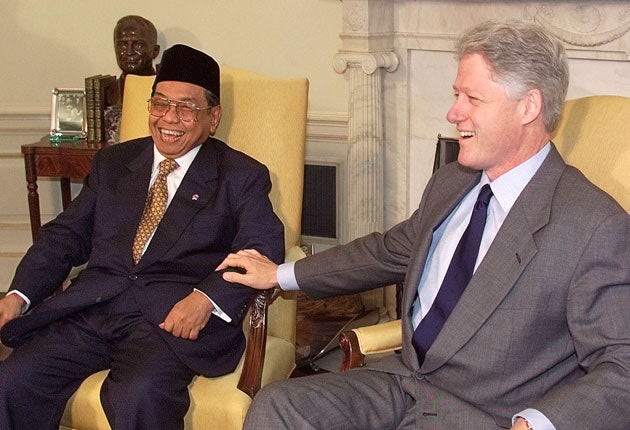Abdurrahman Wahid: Islamic cleric who as president of Indonesia championed secularism and minority rights

Your support helps us to tell the story
From reproductive rights to climate change to Big Tech, The Independent is on the ground when the story is developing. Whether it's investigating the financials of Elon Musk's pro-Trump PAC or producing our latest documentary, 'The A Word', which shines a light on the American women fighting for reproductive rights, we know how important it is to parse out the facts from the messaging.
At such a critical moment in US history, we need reporters on the ground. Your donation allows us to keep sending journalists to speak to both sides of the story.
The Independent is trusted by Americans across the entire political spectrum. And unlike many other quality news outlets, we choose not to lock Americans out of our reporting and analysis with paywalls. We believe quality journalism should be available to everyone, paid for by those who can afford it.
Your support makes all the difference.Abdurrahman Wahid, Indonesia's first democratically elected president, was, by any conventional yardstick, a hopeless politician. Yet he was one of the country's most treasured public figures thanks to his wit, humanism and tolerance, and his death at 69 sparked a genuine outpouring of national mourning.
Known by his nickname of Gus Dur, Wahid was a mass of contradictions: an Islamic cleric and spiritual leader who promoted secularism, a cunning political deal-maker with an erratic and bumbling style, an eccentric intellectual who fell asleep at public meetings – even, on one occasion, while his own speech was being read out in parliament. Elected in the turbulent aftermath of the overthrow in 1998 of Indonesia's long-time dictator Suharto, Wahid served only 22 months of his five-year term before being impeached. Yet his presidency was a key stage in the transition to democracy, and was characterised by brave efforts to atone for the past and to curb the power of the country's military.
Wahid, who came from a prominent and politically active family, visited East Timor to apologise for Indonesian atrocities and tried to resolve secessionist strife in the provinces of Aceh and West Papua. He also espoused the rights of minorities in the world's most populous Muslim nation, including Christians and the often-maligned ethnic Chinese community.
However, his style – unpredictable, enigmatic, informal – alienated many people, including, eventually, the political parties on whose support he depended. He failed to address the pressing issue of a crippled economy, and was plagued by ill-health: virtually blind when he took office, he had diabetes and kidney problems, and suffered a series of strokes.
Wahid's family were from East Java; at the time of his birth in 1940, Indonesia was still part of the Dutch East Indies. His father, Wahid Hasyim, was a hero of the liberation struggle, and became minister of religious affairs in the government of Sukarno, the country's first president, after independence in 1949.
His paternal grandfather had founded Indonesia's largest Muslim organisation, Nahdlatul Ulama (NU), in 1926. As a child, though, Wahid was encouraged to broaden his horizons by reading widely. At 23, he won a scholarship to Al Azhar University in Cairo, where he studied Islamic law. He later attended the University of Baghdad, and lived in Europe for a spell before returning to Indonesia in 1971.
In Jakarta, Wahid worked as a journalist, academic and social commentator. In 1984 he was elected chairman of the NU, which had 30 million members. In the late 1980s he was virtually the only Muslim leader to defend Salman Rushdie following publication of The Satanic Verses.
Charismatic and outspoken, he clashed increasingly with Suharto, who had snatched power in 1967. After the dictator was forced to step down, Wahid formed the National Awakening Party and contested elections in 1999. His party won only 12 per cent of the vote, but political maneouvring saw him elected to the presidency by the national assembly. (Since 2004, presidents have been directly elected by the people.) He quickly stamped his unusual style on the office, dismissing his security minister, General Wiranto, who has been blamed for instigating the atrocities that followed the pro-independence referendum in East Timor in 1999.
Wahid also showed courage in establishing ties with Israel, which he had previously visited to help inaugurate an inter-faith foundation. Back home, though, Indonesia was lurching towards political and economic chaos. Apparently unconcerned, the president embarked on a series of long trips abroad as complaints about his leadership multiplied.
Amid unproven allegations of corruption and nepotism, his critics eventually passed a vote of no-confidence. After being impeached by parliament in July 2001, the president was replaced by his deputy, Megawati Sukarnoputri, the daughter of Sukarno. But Wahid, a brilliant, cultured man who loved Beethoven and jazz, remained an influential public figure, representing liberalism, secular politics and moderate Islam.
After his death last week, weeping admirers lit candles and held prayer vigils at mosques, churches and schools. Thousands of people lined the streets to watch his funeral motorcade pass. A Catholic priest, Franz Magnis-Suseno, said: "All minorities, underdogs or those suffering always felt secure with him. He was a humanist. For people like me, he emitted a friendly Islam."
One politician, Anas Urbaningrum, said: "Gus Dur was an excellent example of a beautiful and peaceful marriage between Islam, Indonesia and modernity. He will always be remembered as an open-minded leader with a free way of thinking."
Kathy Marks
Abdurrahman Wahid, cleric, intellectual and politician; born Jombang, East Java, Indonesia 4 August 1940; chairman, Nahdlatul Ulama, 1984-99; formed National Awakening Party, 1999; president of Indonesia, 1999-2001, impeached in July 2001; married Sintah Nuriyah (four daughters); died Jakarta 30 December 2009.
Join our commenting forum
Join thought-provoking conversations, follow other Independent readers and see their replies
Comments